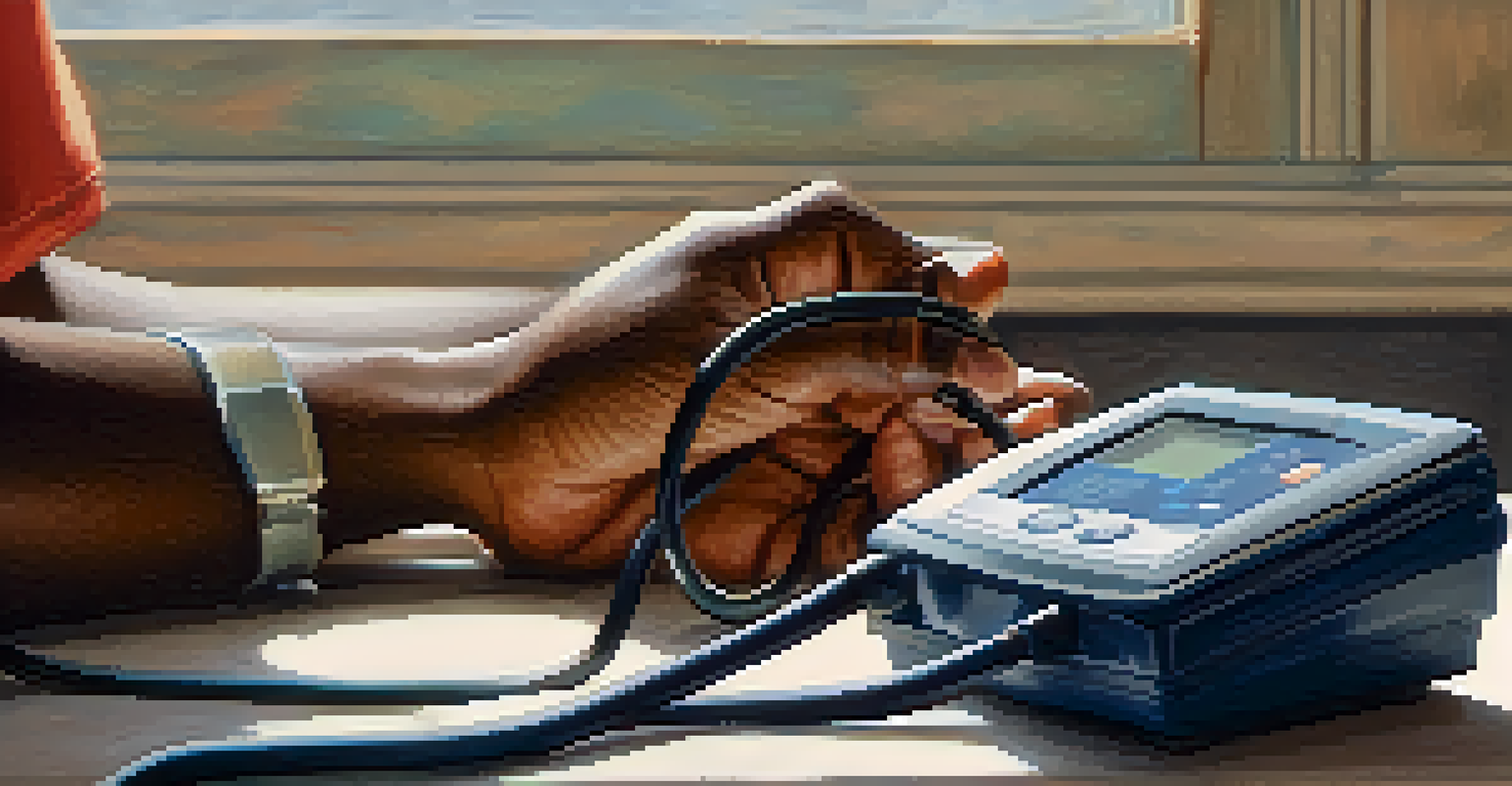The Importance of Community Health Workers in Rural Areas

What Are Community Health Workers and Their Role?
Community health workers (CHWs) are frontline public health professionals who play a crucial role in connecting individuals to health services. They often come from the communities they serve, which helps them understand the unique needs and challenges of local populations. By acting as a bridge between health systems and communities, CHWs enhance access to care, especially in rural areas where resources can be sparse.
Community health workers are essential to improving health outcomes and access to care, especially in underserved areas.
In addition to promoting health education, CHWs provide support for various health issues, including maternal and child health, chronic disease management, and preventive care. They are often involved in outreach activities, ensuring that health information reaches those who may not have easy access to traditional healthcare services. This outreach is vital in areas where transportation and healthcare facilities are limited.
Moreover, CHWs foster trust within the community. Their familiarity with local customs and languages allows them to communicate effectively with residents. This trust leads to improved health outcomes as individuals are more likely to seek care and adhere to treatment plans when they feel understood and supported by someone from their own community.
Bridging the Gap in Healthcare Access
Rural communities often face significant barriers to accessing healthcare, including geographic isolation and a shortage of healthcare providers. CHWs help bridge this gap by bringing services closer to home through outreach and education. For instance, they might organize health screenings, vaccination drives, or wellness workshops right in the heart of the community.

By providing health education and resources, CHWs empower individuals to take control of their health. They help patients understand their health conditions, navigate the healthcare system, and make informed decisions about their care. This empowerment is particularly important in rural settings, where patients may feel overwhelmed by the complexities of healthcare services.
Community Health Workers Enhance Care
CHWs play a vital role in connecting individuals to health services and promoting health education, especially in underserved rural areas.
In essence, the presence of CHWs in rural areas not only increases access to healthcare but also enhances the overall health literacy of the community. This leads to early detection of health issues and promotes preventive care, which can significantly reduce the long-term burden on the healthcare system.
The Impact on Health Outcomes
Research indicates that communities with active CHW programs experience better health outcomes compared to those without. For example, a study found that areas served by CHWs saw a marked reduction in hospital readmission rates and improved management of chronic diseases like diabetes and hypertension. These improvements can be attributed to the ongoing support and education provided by CHWs.
They are the bridge between communities and health systems, empowering individuals to take charge of their health.
CHWs also play a critical role during public health emergencies, such as outbreaks or natural disasters. Their local presence allows for rapid dissemination of vital information and resources, helping communities respond effectively. This proactive approach can save lives and mitigate the impact of emergencies on vulnerable populations.
Moreover, the trust that CHWs build within communities often leads to increased participation in health programs and services. When individuals feel comfortable approaching a CHW, they're more likely to engage in preventive care, leading to healthier lifestyles and improved community well-being.
Training and Support for Community Health Workers
To be effective, CHWs require proper training and ongoing support. This training typically covers health education, communication skills, and how to navigate the healthcare system. Organizations that employ CHWs often provide resources and workshops to ensure their workforce is well-prepared to meet community needs.
In addition to initial training, continuous professional development is essential for CHWs to stay updated on the latest health information and practices. They should also have access to mentorship and support networks that reinforce their skills and confidence. This investment in training ultimately benefits the communities they serve.
Bridging Gaps in Healthcare Access
By organizing outreach activities and providing resources, CHWs empower individuals to navigate healthcare systems and improve health literacy.
Support from local health organizations and government agencies is crucial for the sustainability of CHW programs. By providing resources and advocating for the role of CHWs, these entities can help ensure that these vital professionals continue to thrive in rural areas, leading to long-term health improvements.
Challenges Faced by Community Health Workers
Despite their importance, CHWs face several challenges that can hinder their effectiveness. Limited funding and resources often result in high workloads and burnout, which can affect the quality of care they provide. Addressing these challenges is essential to maintaining motivated and effective CHWs in rural communities.
Another significant challenge is the lack of recognition and support from formal healthcare systems. CHWs may struggle to gain acknowledgment for their contributions and often work in isolation, which can lead to feelings of frustration. Creating a supportive environment, where CHWs are valued as integral members of the healthcare team, is vital for their success.
Finally, ongoing training and professional development opportunities can be inconsistent. Without regular access to new information and skills, CHWs may find it difficult to adapt to changing health needs in their communities. Proper support systems can help mitigate these challenges and enhance the overall impact of CHWs.
Success Stories of Community Health Workers
There are countless success stories highlighting the positive impact of CHWs in rural areas. For instance, in one community, a group of CHWs implemented a diabetes management program that significantly reduced the incidence of complications among patients. By providing education and support, they empowered individuals to take charge of their health and make better lifestyle choices.
Another inspiring story comes from a rural area where CHWs played a crucial role in improving maternal health outcomes. Through home visits and prenatal education, they helped reduce the rates of infant mortality and ensure that mothers received timely care. This proactive approach not only saved lives but also fostered a sense of community trust in the healthcare system.
Training Supports CHWs' Effectiveness
Ongoing training and support are essential for CHWs to adapt to community needs and deliver high-quality care despite challenges.
These success stories serve as powerful reminders of the potential of CHWs to transform health outcomes in rural areas. Each story underscores the importance of investing in and supporting these dedicated professionals to continue making a difference in the lives of those they serve.
The Future of Community Health Workers
Looking ahead, the role of CHWs in rural healthcare is expected to expand as more communities recognize their value. With the growing emphasis on preventive care and community-based health initiatives, CHWs will be crucial in addressing health disparities and improving access to services. Their unique position allows them to tailor health interventions to meet the specific needs of their communities.
Furthermore, as technology continues to advance, CHWs can leverage digital tools to enhance their outreach efforts. For instance, telehealth services can provide CHWs with additional resources to connect patients with healthcare providers, making it easier for individuals in remote areas to receive care. This integration of technology can empower CHWs and improve health outcomes.

Ultimately, the future of CHWs is bright, but it requires continued investment in training, support, and recognition of their vital role. By fostering a collaborative environment with healthcare systems and communities, we can ensure that CHWs remain a fundamental part of the rural healthcare landscape.